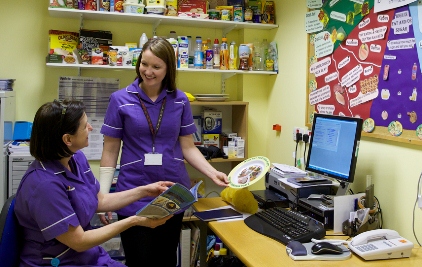Dietetics - Bournemouth Hospital
Our dietitians are based at the Royal Bournemouth Hospital and help treat complex clinical conditions. These include diabetes, food intolerance, irritable bowel syndrome, eating disorders, malnutrition and inflammatory bowel disorders such as coeliac disease, crohn's disease and ulcerative colitis

Dietary advice if you have had COVID
- Dietary advice post COVID if you have a poor appetite or have lost weight
- Dietary advice post COVID infection if you have a good appetite
- COVID rehab booklet
Discharging older adults during COVID-19 - Supporting Dietary Information for home
- BDA Older Adults Factsheet
- Guide to Nutrition and hydration in older age
- A nourishing diet
- Food and drink in hospital
What is a dietitian?
Dietitians are the only qualified health professionals that assess, diagnose and treat dietary and nutritional problems at an individual and wider public-health level. They work with both healthy and sick people. Uniquely, dietitians use the most up-to-date scientific research on food, health and disease which they translate into practical guidance to enable people to make appropriate lifestyle and food choices.
Dietitians are the only nutrition professionals to be regulated by law, and are governed by an ethical code to ensure that they always work to the highest standard.
What service do your dietitians provide?
Our dietitians help treat complex conditions and prevent nutrition-related problems by advising patients and enabling them to make informed choices. They also see patients after operations to ensure they are able to meet their nutritional requirements by either eating normally, or via a tube.
Our dietitians provide advice to our Catering Department to ensure the nutritional content of hospital food is what patients need and also train and educate other health and social care workers regarding nutrition.
How can I access your service?
Your hospital consultant, GP or health professional must refer you to us. Once we receive your referral we will send you a letter asking you to phone us if you would like an appointment.
Helpful resources
Post ICU Nutrition (Part 1: Introduction)
Post ICU Nutrition (Part 2: Meal & Snacks)
Post ICU Nutrition (Part 3: Meal & Snacks)
Post ICU Nutrition (Part 4: Dysphagia / Swallowing Difficulties)
BAPEN 'Malnutrition Self-Screening Tool’
December 2015
This tool, developed by the national Malnutrition Action Group of BAPEN, is accessible on-line. BAPEN is a Charitable Association that raises awareness of malnutrition and works to advance the nutritional care of patients and those at risk from malnutrition in the wider community. This tool is designed to help patients and /or their carers identify their risk of malnutrition and give advice on action to take. The Malnutrition Self-Screening Tool includes an easy-to-use calculator to identify risk of malnutrition, first line dietary advice to improve nutritional intake and encourages those at risk to seek further help and information from their GP or other healthcare professional including Dietitians
For more information please visit http://www.malnutritionselfscreening.org/
Patients Association Nutrition Checklist
The Patients Association Nutrition Checklist has potential for early identification of undernutrition risk, as it identified people in the earlier stages of unintentional weight loss, and people whose appetite had been recently compromised.
https://www.patients-association.org.uk/Blog/patients-association-nutrition-checklist
This short video has been developed by the National Patient Association Organisation to address the rising problems of undernutrition in older people. It’s aimed at helping patients and staff working in health and social care identify the potential risk of undernutrition.
Click here to view the Patients Association Nutrition Checklist video on Youtube









